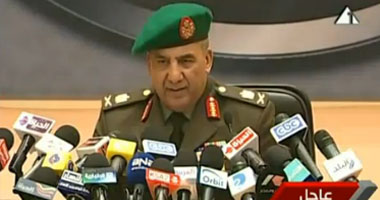
SCAF member Major General Adel Amara held a televised press conference on December 19 after overnight clashes in Tahrir Square, in which thousands of Central Security Forces encircled a crowd of outnumbered and unarmed protesters with batons. As security forces stormed the square spraying pellets, live bullets and eventually tear gas, protesters were finally forced to vacate.
Video taken at the scene shows an asymmetric fight between unarmed civilians and security forces in riot gear.
However, Major General Amara told a very different story in the SCAF’s official press conference, in which he depicted protesters as armed instigators and vandals while lavishing praise on soldiers as the "heroes who bore the unbearable." Rather than the standard SCAF preamble offering condolences to victims, Amara immediately launched into a defensive tirade condemning the destruction of private property by protesters, whom he accused of attacking soldiers with bricks, Molotov cocktails, and butane pipes, while he commended military forces for showing "restraint." Amara complained that protesters preemptively attacked soldiers who had been trying to construct barriers and fences around the square to restore security, and proceeded to set fire to the Scientific Center, a rare books library. Amara asked, "How could an Egyptian burn the most important cultural heritage in the world."
Amara insisted security forces were only acting in self-defense. "The law allows these forces to defend themselves when they are attacked with Molotovs. Faced with the arson of public buildings, should we stand by idly and watch?" Amara asked.
Reverting to the SCAF’s tired counter-revolutionary trope, Amara alluded to a "systematic plan to bring Egypt down." He allowed time for three questions but answered none of them. Instead, Amara interrupted the session to read an intelligence brief handed to him at the podium, which supposedly details a plot to set the Parliament building on fire on December 19. The intelligence alert was delivered as a journalist demanded that the military apologize to all Egyptian women after female protesters were subjected to humiliating and violent assaults by soldiers in Tahrir Square.
The SCAF’s attempt to portray protesters as violent saboteurs is wearing paper thin under mounting evidence from online activists and other eyewitnesses who reported a sustained and asymmetric assault against primarily unarmed civilians. Meanwhile, a statement by U.S. Secretary of State Hillary Clinton on December 19, which called for restraint on both sides, suggested that the Obama administration may be buying the SCAF’s version of the story.
While Clinton urged “Egyptian security forces to respect and protect the universal rights of all Egyptians, including the rights to peaceful free expression and assembly," she also called on "those who are protesting [to] do so peacefully and refrain from acts of violence."
But it’s a little too late to call for mutual restraint in an unfair fight, in which one side has teargas and tanks and the other has, well, Twitter.
Mara Revkin is the assistant director of the Rafik Hariri Center for the Middle East and editor of EgyptSource. She can be reached at mrevkin@acus.org.
Photo Credit: al-Youm al-Saba’a
Image: smal12201119135948.jpg

